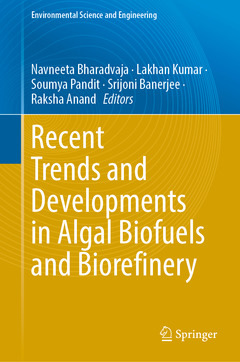Description
Recent Trends and Developments in Algal Biofuels and Biorefinery , 1st ed. 2024
Environmental Science and Engineering Series
Coordinators: Bharadvaja Navneeta, Kumar Lakhan, Pandit Soumya, Banerjee Srijoni, Anand Raksha
Language: English
Subjects for Recent Trends and Developments in Algal Biofuels and...:
566 p. · 15.5x23.5 cm · Hardback
Description
/li>Contents
/li>Biography
/li>Comment
/li>
This book presents technoeconomic challenges, recent trends, and developments toward sustainable algal biofuels and biorefinery. The exponential increase in population and thus the demand for energy, the ever-rising threats to climate change with conventional fossil fuels consumption, fluctuations in fossil fuels price and geopolitical instability have made each and every country of the world to think over its energy independence and security by increasing its own domestic energy production and reducing dependence on scarce fossil fuels. The global need to shift towards a sustainable source of energy has led to the discovery of third and fourth generation biofuels, in which microalgae and their genetically modified strains have been exploited. However, these simple photosynthetic organisms are difficult to select and cultivate for the production of biodiesel. Genetic engineering has opened provisions for the introduction of desired traits to such useful strains. There are also scopes for designing of novel photobioreactors (PBRs) having strain-specific physicochemical parameters, adequate CO2 and nutrient supply, and so on. The role of microalgae in CO2 sequestration from the environment is well known fact. Wastewater treatment plants can be used a raceway pond for the microalgal biomass production, and thus, obtained biomass can be used for biofuels and biochemical production.
Mathematical modelling can be used to understand the complex phenomena inside the photobioreactor, which can be a great help to overcome the limitations related to design and scale up of PBRs. Flow hydrodynamics in PBRs has significant effect on the microalgae growth. Computational fluid dynamics (CFD) can be used to study operating and geometry factors in PBRs that influence the flow dynamics, such as the inlet gas flow rate, mixing, mass transfer, reactor geometry. The use of artificial intelligence (AI) particularly artificial neural network model (ANN model), statistical and evolutionary learning-based techniques are some innovative approaches in manipulating and optimizing productivity and costs in algal biofuel production. This book is aimed to bring several aspects of algal biorefinery and microalgal biofuel production, challenges, and future perspective of microalgal biofuel production at a single place.
Dr. Navneeta Bharadvaja is currently working as an Assistant Professor at the Department of Biotechnology, Delhi Technological University, Delhi, India-110042. She has been actively engaged in research and teaching activity for the last 16 years. She has taught courses like Biopharmaceuticals, Plant biotechnology, Genetic engineering, Genetics, Genomics, Bioethics, Biosafety and IPR etc at UG and PG level. She has guided 5 PhD students and more than 100 BTech/MTech/MSc Students for their respective dissertations.Currently 4 students are pursuing PhD under her supervision. She has published more than 100 peer-reviewed scientific articles in the fields of Medicinal and Aromatic Plants, Algal Biotechnology, Bioremediation, and Biofuels. She has two edited books on biogenic nanomaterials and algal biotechnology. She has attended several conferences and workshops and has delivered invited lectures in the area of her research.
Dr. Lakhan Kumar works at the Department of Biotechnology, Delhi Technological University, Delhi, India. He completed his B. Tech in Biotechnology from the National Institute of Technology, Jalandhar, and M. Tech in Industrial Biotechnology from Delhi Technological University, Delhi. He obtained his PhD in Algal Biotechnology from Delhi Technological University, Delhi, India, where he investigated the application of native freshwater microalgae for biodiesel production, accumulation, and enhancement of chemicals of industrial significance, including b-carotene, polyhydroxy butyrate, and lutein; synthesis of biochar and nanoparticles for environmental remediation. He has more than six years of academic and administrative experience. He has supported more than 15 Masters and 10 Bachelors students from Biotechnology, Environmental Engineering, and Mechanical Engineering in completing their dissertations in algal-based biofuel, biochemical production, and bioremediation. He has been awarded the Research Excellence Award from Delhi Technologica
Provides complete coverage of the algal biodiversity, algal-based biofuels, and biochemical production processes
Includes a detailed discussion of several unit operations adopted from bioprospecting microalgae
Presents technoeconomic challenges, recent trends, and developments toward sustainable algal biofuels and




